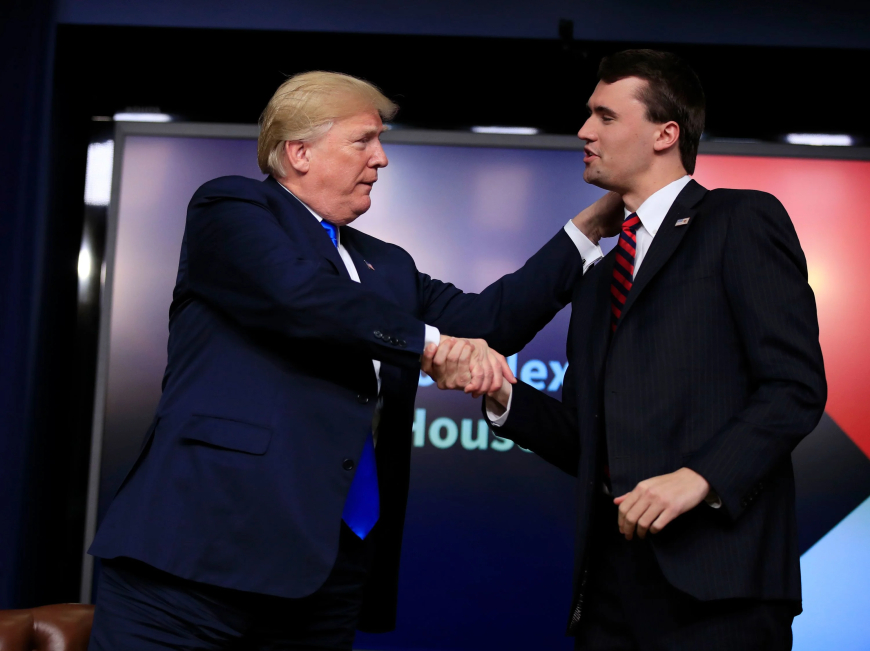Trump Adopts ‘Messenger-in-Chief’ Role After Kirk Assassination, Blending Justice Promises with Political Fire
President Donald Trump adopts a “messenger-in-chief” role after Charlie Kirk’s assassination, vowing justice while criticizing opponents and raising concerns about federal independence.

In the aftermath of conservative commentator Charlie Kirk’s assassination, President Donald Trump has stepped into what aides describe as a new “messenger-in-chief” role, using the tragedy not only to rally his supporters but also to sharpen attacks on political opponents and federal institutions.
The president’s swift response highlights both the gravity of the moment and his instinct to leverage crises for political momentum. While many leaders issued calls for unity, Trump made clear that his administration would seek swift justice for Kirk’s killers while drawing broader connections to what he framed as a climate of hostility fueled by his detractors.
A Nation in Mourning, A President on Message
Kirk, a high-profile conservative activist and founder of Turning Point USA, was killed earlier this week in an attack that remains under active investigation. Federal law enforcement has yet to disclose detailed motives, though officials confirmed the involvement of a “politically motivated network.”
Speaking from the White House, Trump declared:
“Charlie Kirk gave everything to this country. He fought for our values, our freedom, and our future. His killers will face the full force of American justice.”
Yet Trump’s message went beyond tribute. He tied the assassination to broader themes that have defined his presidency—allegations of media bias, political violence, and distrust of federal agencies.
Rallying Support Amid National Grief
The president’s schedule since the tragedy has been marked by rapid-fire appearances: rallies in Ohio and Texas, primetime interviews, and a flurry of posts on Truth Social. Each message struck a familiar balance—mourning Kirk, vowing retribution, and urging supporters to “stay strong” against what he described as “forces trying to silence conservative voices.”
Political analysts note that Trump’s framing serves two purposes: it honors Kirk while reinforcing the idea that the conservative movement is under siege, thereby energizing his base.
“What we’re seeing is a strategic use of crisis communication,” said Dr. Laura Jennings, a political scientist at Georgetown University. “Trump is placing himself at the center of both the grief and the fight, effectively becoming the movement’s voice in a period of trauma.”
Tensions Over Federal Independence
The assassination also revived simmering debates over the Federal Reserve and its independence from political influence. In recent weeks, Trump has sharply criticized Fed Chair Jerome Powell, accusing him of “crippling the economy” with high interest rates.
Critics argue that Trump’s rhetoric risks undermining confidence in financial institutions at a time when market volatility is already high. Some see a pattern in the president’s approach—using moments of national crisis to question not only political rivals but also the foundations of federal independence.
Economists at the Brookings Institution have warned that “politicizing the Fed during periods of instability could destabilize long-term economic recovery,” noting that the central bank’s credibility depends on its distance from electoral politics.
Threats and Political Polarization
Security officials have also raised alarms about the rise in political threats following Kirk’s death. The Department of Homeland Security reported an uptick in online chatter from extremist groups, some promising retaliatory violence.
At rallies, Trump has spoken directly to these concerns, urging vigilance but also leaning into fiery rhetoric. “They think they can scare us into silence,” he told a crowd in Dallas. “But we are louder, stronger, and more determined than ever before.”
Democrats, meanwhile, have called for restraint. Senator Elizabeth Warren emphasized the need for “responsible leadership” and warned that escalating rhetoric could inflame tensions further.
A Messenger-in-Chief Strategy
Trump’s posture reflects an evolution in his political style. While he has always thrived on confrontation, the Kirk tragedy has accelerated his transition into a role where he speaks not only as commander-in-chief but also as what one aide called “messenger-in-chief.”
In this model, Trump positions himself as the essential voice of his movement—channeling its grief, outrage, and resilience. Supporters argue that his authenticity resonates deeply, while critics warn that it risks deepening divides at a moment when unity is desperately needed.
What Comes Next
The investigation into Kirk’s assassination remains ongoing, and authorities have urged patience as evidence is processed. Meanwhile, Trump’s role as both mourner and messenger will continue shaping the political landscape in the weeks ahead.
Whether this strategy strengthens his grip on the Republican Party or accelerates national polarization remains uncertain. What is clear is that Trump has seized the moment to redefine his voice—not just as a political leader, but as the movement’s chief communicator in an era of escalating threats.
What's Your Reaction?
 Like
0
Like
0
 Dislike
0
Dislike
0
 Love
0
Love
0
 Funny
0
Funny
0
 Angry
0
Angry
0
 Sad
0
Sad
0
 Wow
0
Wow
0
































